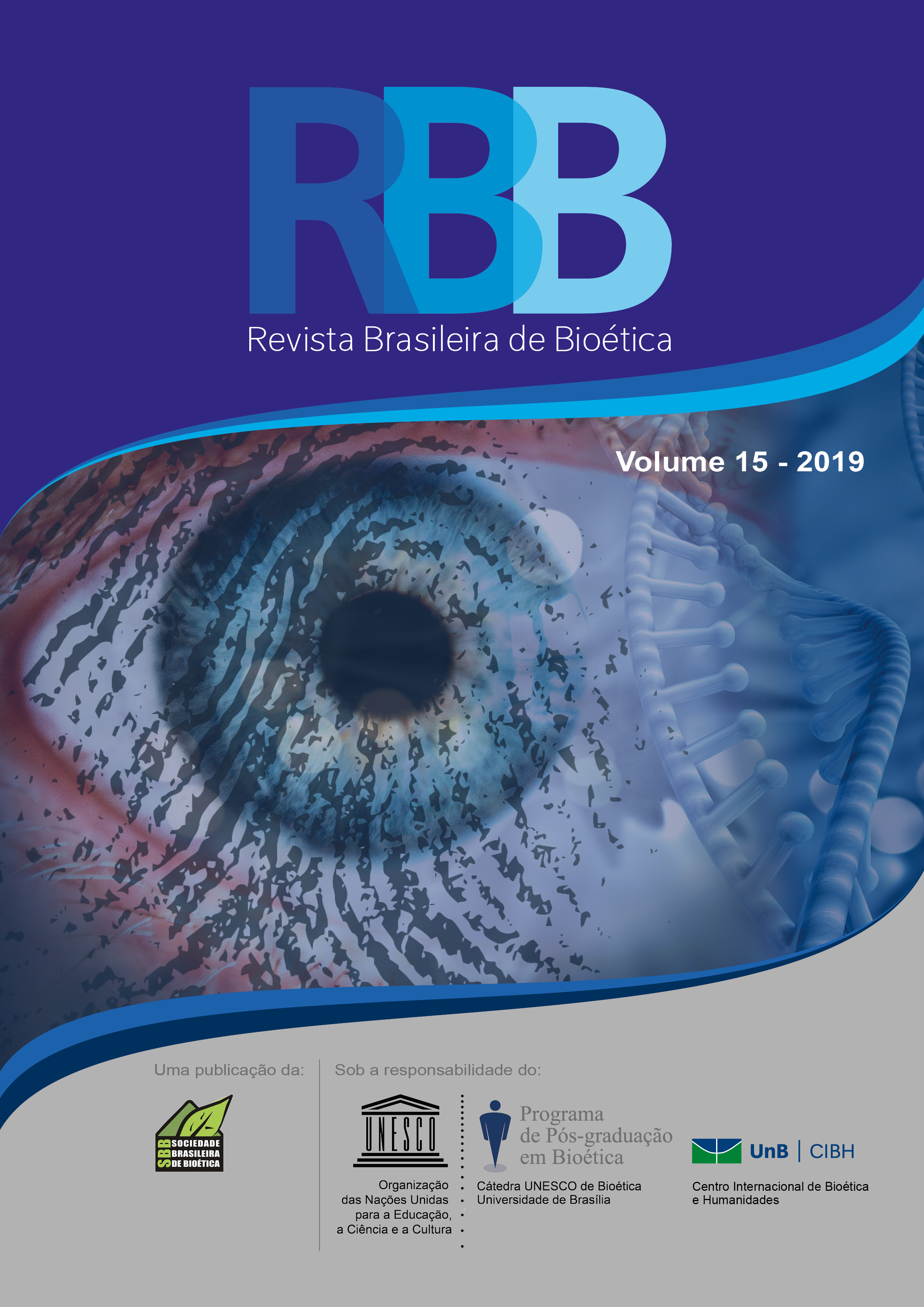Judicialization of health: a matter of necessity in rare diseases
espaõl
DOI:
https://doi.org/10.26512/rbb.v15.2019.22929Keywords:
Judicialização da saúde. Doenças raras. Acesso a medicamentos. Direito à saúde. Sistema de saúde. Políticas públicas. Bioética.Abstract
This article seeks to analyze the phenomenon of the judicialization of health in the field of rare diseases under a bioethical perspective. A topic that has awakened the interest of ethical discussions in this regard, because it is not the fairest way to resolve the problems caused by these diseases. It is a mechanism that has had a disproportionate growth in recent years as a search for protection and guarantee of the right to health. It is related to guaranteeing access to diagnostic, therapeutic and health input procedures. In rare diseases, judicialization is the main means to force the State to provide orphan drugs and/or high-cost treatments not incorporated into health systems, which are vital for the improvement of health and quality of life of the patients. people. The ineffectiveness of public health policies generates an increase in the judicialization of the right to health. So, the challenge is to develop effective health policies and implement strategies, in order to improve health systems that guarantee the effectiveness of the right to health.
Downloads
References
Barbosa A, Schulman G. (Des)judicialização da saúde: mediação e diálogos interinstitucionais. [Internet]. Rev bioét. (Impr.) 2017. [acceso 30 sept 2018]. 25(2):290-300. Disponible en: http://revistabioetica.cfm.org.br/index.php/revista_bioetica/article/view/1365/1666
Biehl J, Social MP, Amon JJ. The Judicialization of Health and the Quest for State Accountability: Evidence from 1,262 Lawsuits for Access to Medicines in Southern Brazil. Health and Human Rights Journal. 2016;18(1):209-220.
Campos A. Dórea J, Monsores N. Judicialização de eventos adversos pós-vacinação. [Internet]. Rev bioét. (Impr.) 2017. [acceso 1 oct 2018]. 25(3):482-92. Disponible en: http://revistabioetica.cfm.org.br/index.php/revista_bioetica/article/view/1354/1728
Comité de Derechos Económicos, Sociales y Culturales. El derecho al disfrute del más alto nivel posible de salud. Observación general No. 14 [Internet]. Ginebra: Naciones Unidas 2000 [acceso 1 oct 2018]. Disponible en: http://tbinternet.ohchr.org/_layouts/treatybodyexternal/TBSearch.aspx?Lang=en&TreatyID=9&DocTypeID=11
Daou HS, Rodrigues J. Políticas públicas e direito à saúde: necessidade de uma alternativa para além da judicialização. Revista de Direitos Fundamentais nas Relações do Trabalho, Sociais e Empresariais. 2017;3(1):79-95.
Duarte CS. O ciclo das políticas públicas. In: Smanio, GP. Bertolin PTM. O Direito e as Políticas Públicas no Brasil. São Paulo: Atlas; 2013. p. 16-43.
Dworkin R. Levando os direitos à sério. Trad. Nelson Boeira. 1 ed. São Paulo: WMF Martins Fontes, 2002.
Daniels N. Accountability for reasonableness: Establishing a fair process for priority setting is easier than agreeing on principles. BMJ Br Med J. 2000;321(7272):1300.
European Organisation for Rare Diseases. Enfermedades Raras: El conocimiento de esta prioridad de la salud pública. [internet]. Traducción en español por Asociación Española de Miastenia. 2005 [acceso 30 sept 2018]. Disponible en: https://www.eurordis.org/IMG/pdf/Princeps_document-SN.pdf
European Organisation for Rare Diseases. Concepto medicamentos huérfanos. [Internet]. EURORDIS 1997. [acceso 2 oct 2018]. Disponible en: https://www.eurordis.org/es/medicamentos-hu%C3%A9rfanos
Lisboa E. Portela LE. Por que as pessoas recorrem ao Judiciário para obter o acesso aos medicamentos? O caso das insulinas análogas na Bahia. Ciência e Saúde Coletiva. 2017;22(6):1857-1864.
Marin G, Polach A. Medicamentos de alto costo: análisis y propuestas del MERCOSUR. Rev Panam Salud Pública. 2011;30(2) p. 167.
Organización Panamericana de la Salud. El acceso a los medicamentos de alto costo en las Américas: contexto, desafíos y perspectivas. 2009. [Internet]. Área de Tecnología, Atención de la Salud e Investigación Proyecto de Medicamentos Esenciales y Productos Biológicos [acceso 29 sept 2018]. Disponible en: http://apps.who.int/medicinedocs/documents/s23254es/s23254es.pdf
Oficina del Alto Comisionado de las Naciones Unidas para los Derechos Humanos. El derecho a la salud. Folleto Nº 31 [Internet]. Ginebra: Naciones Unidas 2008 [acceso 30 sept 2018]. Disponible en: http://www.ohchr.org/Documents/Publications/Factsheet31sp.pdf
Organización Mundial de la Salud. Concepto de salud [Internet]. [acceso 30 sept 2018]. Disponible en: http://www.who.int/about/mission/es/
Organização das Nações Unidas para a Educação, a Ciência, e a Cultura. Declaração universal sobre bioética e direitos humanos [Internet]. París: Unesco 2005 [acceso 1 oct 2018]. Disponible en: http://bit.ly/1TRJFa9
Perlingeiro R. La tutela judicial del derecho público a la salud en Brasil. Revista Derecho, Estado y Sociedad. 2013;41: p:186-187.
Pinzón CA, Chapman E, Cubillos L, Reveiz L. Priorization of strategies to approach the judicialization of health in Latin America and the Caribbean. Rev Saúde Pública. 2016;50:1-14
Ramos R, Tosoli AG, Oliveira DC, Corrêa S, et al. Access the Unified Health System actions and services from the perspective of judicialization. Revista Latino-Am. Enfermagem. 2016;24e2797: p. 1-7
Sesma IB. Derecho a la protección de la salud. In: Teldi JC, director. Diccionario Latinoamericano de Bioética. Bogotá: Editora Unesco, Universidad Nacional de Colombia; 2008. p. 246-247.
Syrett K. Evolving the Right to Health: Rethinking the Normative Response to Problems of Judicialization. Health and Human Rights Journal. 2018;20(1):121-132.
Ventura M, Simas L, Pepe VLE, Schramm FR. Judicialização da saúde, acesso à justiça e a efetividade do direito à saúde. Revista de Saúde Coletiva. Rio de Janeiro. 2010;20(1):77-100.
Downloads
Published
How to Cite
Issue
Section
License
Copyright (c) 2019 Revista Brasileira de Bioética

This work is licensed under a Creative Commons Attribution-NonCommercial-ShareAlike 4.0 International License.



